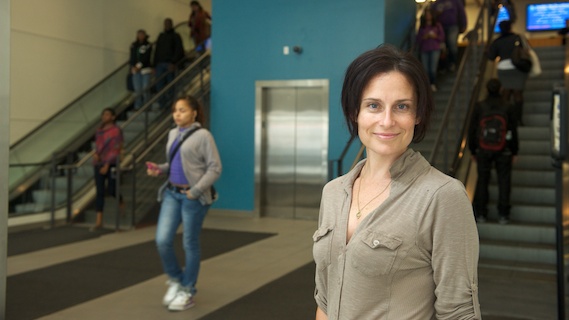
Lecturer Aimee Record teaches Women in Literature, a course that goes beyond—way beyond—just reading and discussing classic stories.
What makes Record’s course different is that she puts traditional literary texts in the context of contemporary culture and students’ lives.
“I incorporate historical, economic, social and cultural elements that further explore Women’s writing in the English Tradition—texts written in English, not translated into English—from medieval to present time,” says Record, who strongly encourages class discussions. “I want students to feel free to disagree, believe in their own beliefs, to speak freely, question and actively search.”
Of course, there are always students who are camera-shy when it comes to class participation. Record is “protective of the more timid student” when he or she states their beliefs.
“I think it my job to provide the space to express your beliefs in the classroom. That is not to mean I won’t encourage debate,” she explains. “A popular classroom discussion, for example, may be ‘What would you do in that time; if you had an arranged marriage like this character did?”
Changing times
So—why Women’s Literature? Why makes it so crucial in today’s world?
“We do not have a lot of literature from oppressed groups, we do not have historical outlooks of oppressed groups, we have not valued the psychological and cultural considerations of oppressed groups in our studies for as long as we have the ruling groups,” says Record.“Academia has been structured to value the ruling group in every way for a long time. Having a minority’s study class—even when that minority is the majority— is a way of addressing history.”
Comparing and contrasting
Record mostly teaches her Women in Literature students fairy-tale myths and translations, but the majority of the class compares and contrasts past and present works
“I really love the projects the class does mid-semester comparing 17th through turn-of-the-century writers to modern-day female figures.”
Last semester, Record’s students learned about civil rights activist and former slave Harriet Jacobs (1813–1897), who fought against her “master’s” sexual advances, and novelist Harriet Wilson (1825–1900), who worked as a child servant for a New Hampshire family in exchange for room and board.
The students compared the views of Jacobs and Wilson to those of Elizabeth Smart’s kidnappers, who coerced the Utah teenager into a polygomous “marriage,” in 2002.
“We’ve also had classroom discussions about Britney Spears, Lady Gaga and Beyonce’s song lyrics because they seem to be the pop-cultural icons that address the mythic ideas of women.”
Overcoming skepticism
Record has greatly influenced and impacted some of her students; opening their eyes to new ways of viewing women’s studies.
“One student started a women’s group in her building that read and discussed the texts I assigned in the class,” says Record. “This student has also worked to assure rights for women in construction positions.”
English major Amal Abbass was “skeptical” of Record’s course—at first.
“Women in Literature was an alien concept to me. The women’s movement wasn’t something I often thought about,” she recalls. “Women struggling for some semblance of equality seemed distant to me because it felt far away from where we are as a country today.”
Abbass says Record’s course “completely changed my viewpoint.”
“We analyzed concepts that women have struggled with throughout time—gender roles, the meaning of femininity and strength, motherhood, being a wife or a single woman or something in between—and trace them from the Bible, onward. It felt like a history class because we were traveling through different time periods,” she says. “The idea of “feminism” became far less abstract when I could directly see the ways in which each woman had affected the next, and the echoes of those that came before in every author’s work.”
The main message Abbass took away from Record’s course?
“Literature is a very intimate way to relate to someone.”
Taking the course to a cyber level
This semester, Record is also teaching Women in Literature online, which will make for a unique participation experience.
“I am using YouTube videos, notes and discussion boards to create a conversational type of atmosphere about the course,” says Record. “The class will respond to the readings in a journal style but then answer a more directed question on Discussion Board. Students will also respond to each other via Discussion Board, which will lead to writing formal papers.”
This type of responding, she says, “is what class conversations usually enable which deepens critical thinking and questioning.”
The male perspective
According to Record, male students say they took the course “out of curiosity.”
“They like to hear what the female students have to say and vice versa,” she says.
Record shares a personal anecdote about a recent classroom event involving a male student.
“We were discussing one of Izumi Shikibu’s poems. Shikibu lived in the imperial court during the only golden age in literary history in which women writers were predominant,” explains Record.
After dissecting the poem, a male student said, “That’s deep. I’m going to use that as a pick-up line.”
“It was funny because that was his first real participation in the class,” recalls Record. “The women took notice of him after that. I guess it was because he showed some desire to understand women.”
STORY HIGHLIGHTS
- Class discussions compare past and present writings.
- Students examine how women in literature have changed and grown over time.
- Professor Record brings historical literature to life with pop-culture references.

